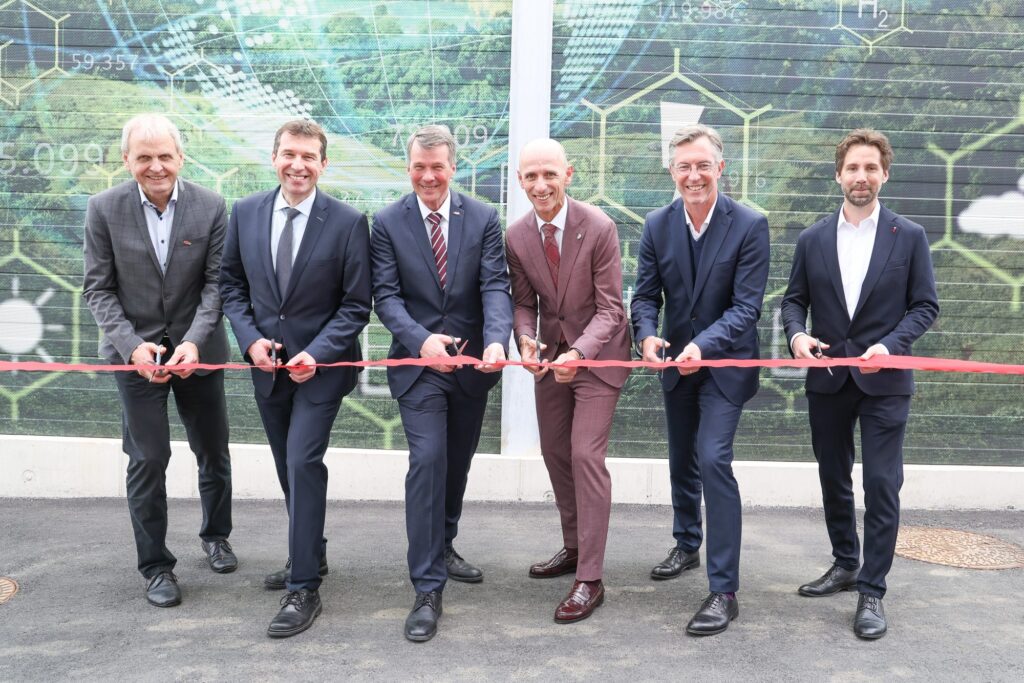Austria has made a bold leap towards a climate-neutral future by launching a hydrogen electrolysis test centre on Tu Graz’s campus Inffeldgasse.
This cutting-edge facility is the first in the country and a major milestone in the country’s hydrogen strategy.
The hydrogen electrolysis center, spanning 250 square meters, has a total power output ranging from 1.6 to 2.5 megawatts and features advanced electrolytics.
Equipped with a dedicated transformer station, the site produces up to 50 kilograms of green hydrogen in full capacity, simulating real-world energy supply scenarios.
The hydrogen is compressed to 80 bar and stored in a towering 18-meter tank that can hold 190 kilograms (48m³).
From there, a 315-meter underground pipeline distributes hydrogen to several research institutes on campus, allowing 24/7 access to hydrogen for next-generation energy experiments.
10 million euro investment in clean energy
The test centre, which has been supported by federal funding by €10 million, is part of a €17 million initiative to expand Styria’s hydrogen research.
Of this, 4.5 million euros were allocated specifically to hydrogen electrolysis facilities, with the remaining funds directed towards fuel cell testing equipment, gas mixing stations, compressors and safety instruments.
The Green Hydrogen and Fuel Technology Research Center, known as the “Hydrogen Campus,” already employs around 250 scientists at four Tu Graz agencies and three comet capacity centers.
Their work spans a complete innovation chain, ranging from raw materials science to hydrogen production, storage, distribution, and the use of vehicles and industry.
Increases Austria’s global hydrogen profile
By enabling industrial-scale research and development, Tu Graz has established itself as Austria’s flagship, the University of Hydrogen.
This integrated research environment provides rare opportunities to test systems under real-world conditions, supporting both academic discovery and commercial applications.
The collaborative approach of universities guarantees a strong relationship between academia, government and industry.
This not only advances Austria’s hydrogen target, it also attracts international attention and strengthens Styria’s growth position as a European hub for hydrogen innovation.
Complementary efforts across Styria
The region’s commitment to hydrogen exceeds Tu Graz. Montanuniversität Leoben, which received 7 million euros with federal funds, complements Graz’s efforts through work at the Austrian Centre for Hydrogen and Carbon Research (HY-CARE).
Its focus lies in process technologies that scale industrial hydrogen production while examining the entire hydrogen carbon value chain.
Together, these institutions create a strong network that drives innovation across borders. The joint efforts will help transform Stylia into one of Europe’s first hydrogen valleys for industrial use only.
Real-world testing of future technology
Hydrogen-generated onsite burns a diverse portfolio of test platforms. Researchers are currently conducting rigorous evaluations of large-scale engines, turbines, hydrogen burners and fuel cell stacks.

The facility design supports long-term durability testing, accelerated aging simulation, and advanced degradation analysis.
Integrated high-precision analytical tools allow real-time gas and water quality monitoring, allowing the production of hydrogen to meet global standards, even before purification.
Innovation under extreme conditions
One outstanding feature of Tu Graz’s new infrastructure is its ability to simulate extreme environmental conditions, such as steep angles and high temperatures. This is a condition related to marine and aviation use.
The newly developed fuel cell stack test rig is intended to increase operational lifespan and reduce dependence on rare earth metals such as platinum.
Meanwhile, hydrogen-driven high-temperature burners are being tested at Tu Graz’s Thermal Engineering Laboratory.
These experiments test hydrogen natural gas blends at exhaust temperatures up to 1,500°C, providing a higher power output of 1.2 megawatts. The results could potentially reconstruct the way the industry uses gas for heat and electricity.
Towards a sustainable energy future
Hydrogen Electrolysis Center is a green technology launchpad that promotes the next generation. From basic science to large-scale applications, Tu Graz creates an ecosystem where innovation meets implementations.
By bridging the gap between the lab and the market, Austria lays the foundation for a sustainable hydrogen fuel economy and brings Europe to carbon neutrality.
Source link

